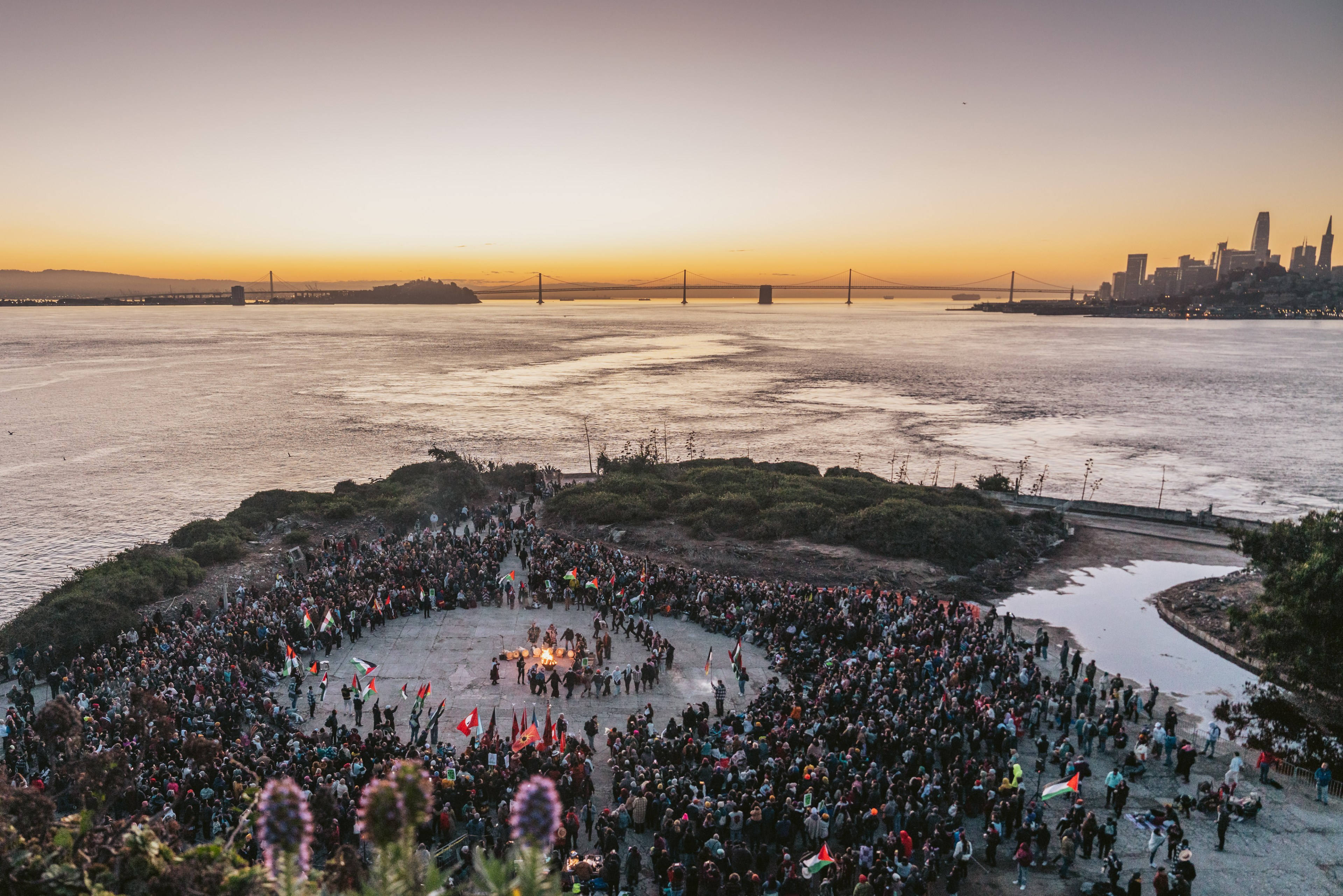When the sun rose over Alcatraz on Thursday, Palestinian flags waved back and forth at the center of a 4,000-person circle of people who had come to the island to take part in a decadeslong ceremonial tradition for Indigenous people.
For nearly 50 years, Native Americans and others have gathered on Thanksgiving Day on the island for a sunrise ceremony to build bonds with one another and counter the holiday’s lore about the Pilgrims sitting down peacefully with Native Americans.
But this year’s event and its organizers—the International Indian Treaty Council—emphasized what they see as parallels between Native Americans’ violent removal from their land by colonial settlers and the ongoing struggle of Palestinians, who were themselves displaced in what many in the Middle East call the Nakba, when Israel was created in 1948.
The focus on the Palestinian struggle at this year’s event comes in the wake of unprecedented fatalities in a decadeslong violent struggle between Palestinians and Israelis.
While some activists see similarities between the experience of Native Americans and Palestinians, critics note the Israelites’ presence in the area that is now the Jewish state goes back millennia, and Israel should not be regarded as colonialist.
With a Palestinian scarf, called a kaffiyeh, draped over her shoulder, Morning Star Gali—who has headed up the event for the past 15 years—said the number of Palestinian kaffiyehs worn by participants Thursday morning was a symbol of “Indigenous solidarity and resistance” with Palestine. A number of Native Americans attending and leading the ceremony said that their solidarity with Palestine did not mean they are anti-Jewish.
“We are not anti-Jewish; we are pro-human rights,” Stan Rodriguez said.
Lara Kiswani, who has been coming to the ceremony for 20 years, said she came with about 70 other Palestinians to “join our Indigenous brothers and sisters.”
Kiswani is with the Arab Resource and Organizing Center, which was just one Palestinian group who participated in the ceremony by speaking, dancing and playing music at the center of the event.
“Our struggles are one, our fates are intertwined and we are here together to join them,” she said, describing Israeli occupation of Palestinian land in a similar vein as the dispossession and occupation of indigenous lands in the United States.
The Sunrise Ceremony
In the dark early morning hours, crowds of people lined up on San Francisco’s Embarcadero at Pier 33 to board ferries plying the waters between the city and the island.
Families with small children were wrapped in blankets or thick coats, boarded the boats beside members of local Native American groups such as the Pomo and the Pit River Tribe as well as more distant groups such as the Paiute, Navajo, Mexica and Maya.
But the crowd was made up of people from all walks of life, including a Buddhist monk in his yellow robe, a member of the Hells Angels motorcycle club, and members of the Chicano activist group the Brown Berets.
When the boats landed on the island, people streamed up to a broad flat open space below the former prison’s lighthouse, where a bonfire burned in the dark. The scent of incense and sage filled the air as dancers in headdresses and tribal regalia readied themselves for the ceremony.
A series of speakers, including imprisoned Native American activist Leonard Peltier’s spiritual advisor, entered the giant circle with dancers. All of it, meanwhile, was broadcast live on KPFA, or what was called by participants “Radio Free Alcatraz.”
Just before sunrise, the Palestinian contingent had taken center stage, and the crowd began chanting “free, free Palestine,” as one of the event’s emcees said into the microphone, “From the river to the sea, Palestine will be free.”
After the sun had risen and some in the crowd began to make their way back to the boats headed to San Francisco, Sara Twiss stood looking out at the San Francisco Bay beside her son.
Twiss, member of the Trout Eating People, or northern Paiute in Nevada, said her journey to that morning’s ceremony marked her first time on Alcatraz. She hoped to teach her son about the history of Native American resistance to the first settlers and show him the throughline to the creation of the American Indian Movement in recent decades.
“I wanted to teach my son about these movements and how they start,” she said, “and how we can continue them.”
